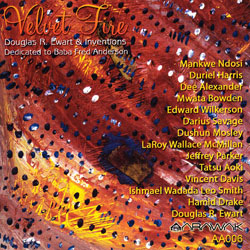
Recordings by Douglas Ewart, one of the co-founders of Chicago's Association for the Advancement of Creative Musicians, are far too few between. The scope of the saxophonist's work, from instrument building to the staging of site-specific performances (and even intercontinental concerts staged via internet) are often outside the realm of recording. So when he does issue an audio document, it's generally worthy of notice.
Velvet Fire: Dedicated to Baba Fred Anderson was recorded live at its dedicatee's Chicago club (with one track from the Guelph Jazz Festival) in 2009. What's most remarkable about this modest release — a CD-R in a slim-line case with a single panel insert — is the surprising diversity in the material. The disc opens with the title track, 16 minutes of hard jazz for Anderson, who died June 24 of this year. After that are a couple of vocal tracks performed by Duriel Harris, Dee Alexander, Mankwe Ndosi reminiscent of Sweet Honey in the Rock and other creators of African American a cappella tradition. That's followed by a long, easy-going and joyous blues then a quick, clever and admittedly belated George Bush indictment, both penned by Ewart. "737" is probably the most satisfying track here in terms of AACM jazz experimentation, a wide ranging multi-horn exploration that builds to another full band work-out. After another brief Ndosi poem, the disc wraps with 11 minutes of "Crepuscule," Ewart's signature composition and a work that, like fellow AACM co-founder Roscoe Mitchell's "Noonah," strikes as more of an area of harmonic exploration than a theme song, the possible Monk reference notwithstanding.
It's on this final piece that the remarkable band of Chicagoans Ewart assembled most shines. The horn line (and Chicago's all about horns) consists of Mwata Bowden, Edward Wilkerson and LeRoy Wallace McMillan, with the leader heard on sopranino and alto saxophones as well as bassoon. Backing them are guitarist Jeffrey Parker, bassist Darius Savage and drummer Dushun Mosley. (Tatsu Aoki and Vincent Davis also appear on the title track and the short Guelph piece credits Ishmael Wadada Leo Smith and Hamid Drake). There are some unnaturally faded endings, but the only real complaint to be made here is the recording quality. This was the sort of night that in Chicago no doubt felt like legend, and it would be nice to have a richer rendering than what sounds like an audience recording. But the material is exciting enough that we might just agree to be thankful for what we have.
Comments and Feedback:
|



